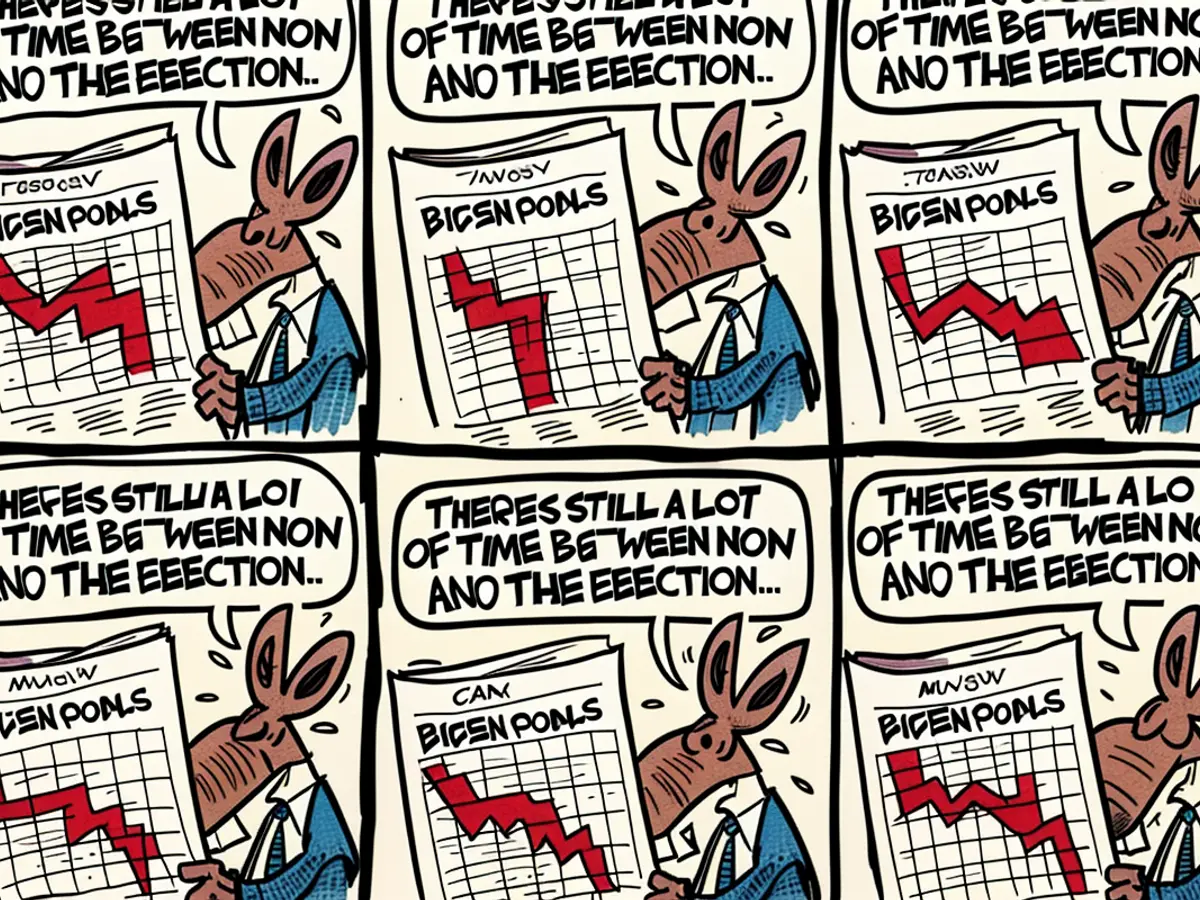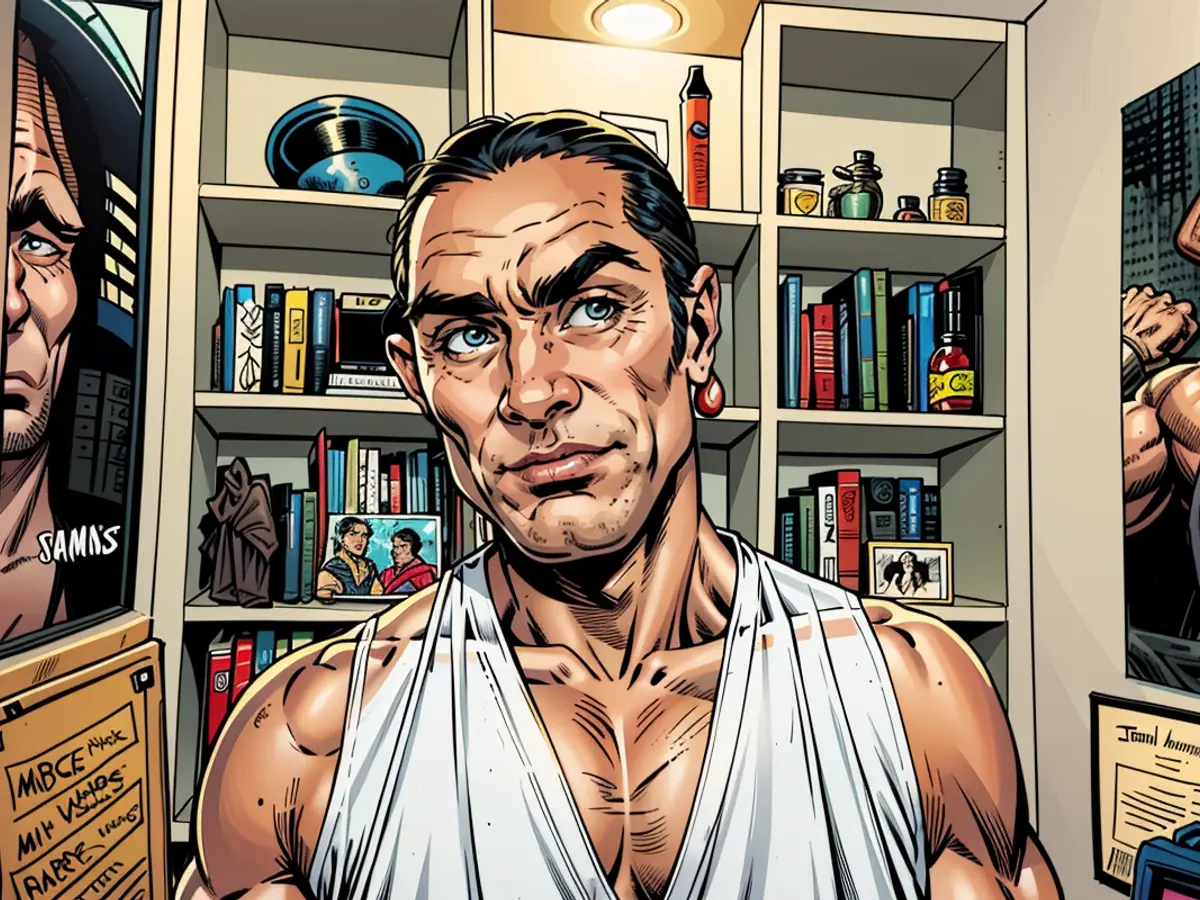Opinion: The shipwreck of our leaders
That’s how former French President Charles de Gaulle explained the arc of Marshal Philippe Pétain’s career. A military hero of World War I, Pétain formed the Vichy government at the age of 84 and shamefully collaborated with the Nazis who had invaded much of France in World War II.
But there is a far more positive model for governing at an advanced age: Benjamin Franklin. “As an octogenarian, he was by far the oldest delegate at the Constitutional Convention,” wrote Eric Weiner, an author and former NPR international correspondent. “Many doubted whether Franklin was up to the task and snickered behind his back, but he proved them wrong. He contributed mightily, helping to set a tone of compromise and crafting a breakthrough that saved the day, and the young republic.”
Franklin was 81 then, the same age as President Joe Biden. “Lost in the debate about how old is too old to occupy the White House is the fact that chronological age tells us little about a person,” Weiner wrote. “It is not how old someone is but the kind of old that matters. Are they grumpy old or sanguine old? Resigned old or bold old? Franklin was in a category unto himself. He was never president, of course, but he proved that age need not be an impediment to sage and inspired leadership.”
Neither a Pétain nor a Franklin showed up for Thursday’s presidential debate on CNN, but the two highly imperfect performances by Biden and former President Donald Trump set off alarm bells among many Americans who have to choose a president this fall. Who’s a better golf player, who has the “biggest heart,” who did or didn’t have sex with a porn star and has the “morals of an alley cat” were among the surreal moments in the 90-minute debate.
“The split screen of Trump and Biden gave us one man utterly engaged in the fight of his political career — attacking, parrying, vicious — and another man who at times did not seem to be sure where he was,” wrote Ana Marie Cox.
“Trump repeated falsehoods and fumed about conspiracies and made preposterous promises and untethered boasts. He was full of hot air — but the air had a shape to it. Trump filled a gigantic lie balloon and Biden just hissed out some words. When I could make out those words, they aligned with my own beliefs ... so there’s that.”
Shermichael Singleton, a Republican strategist, argued that “Trump exceeded expectations Thursday night. He was disciplined, calm, confident and stable. It was obvious that the former president recognized how critically important this debate was and how crucial it was for him to come across as stable and judicious in his tone.”
Democratic strategist Paul Begala didn’t mince words about his party’s candidate: “President Joe Biden’s style was simply awful... His voice was shot, some answers meandered and he often stared open-mouthed as former President Donald Trump spoke.”
“The calls for Biden to step aside began, albeit privately, before the debate was even over. They will crescendo in the days ahead. Most Democrats — and a sizeable number of independents and Republicans — see Trump as a threat to democracy. They need a warrior, not a whisperer,” Begala asserted.

Dear Joe
Author Jay Parini is from Biden’s hometown of Scranton, Pennsylvania. His mother was Biden’s babysitter and he’s been a longtime admirer of the president. Writing an open letter to Biden for CNN Opinion, Parini said, “Few leaders in American history have had your big heart or sense of moderation. You rescued this country from disaster in 2021, returning us to a sense of normalcy after a brutal insurrection, featuring a crazed mob who smashed the windows of the Capitol and threatened to hang then-Vice President Mike Pence...”
“But you’re an old man now, like me. I know what it’s like to summon the energy to move forcefully through the day. Our bodies don’t cooperate as they once did. Sometimes it hurts even to get up in the morning.”
“Sadly, that was evident to me from the moment you walked — dazed and confused — onto the debate stage Thursday in Atlanta against former President Donald Trump. You seemed ancient, pale and fragile. You almost groped your way to the podium. Your speech was halting, often incoherent. Your jokes fell flat, badly timed, out of context. You let crazy Donald lie with impunity and snicker at your responses.”
“I found myself weeping. Weeping for you. Weeping for our nation.”
“You’re a man of huge integrity, Joe, and you must — you MUST — stand down. Do it for your country and your party. The threat of another four years of Trump ... is existential.”
Optics and sonics

Biden “did nothing to assuage the fears among his base that he might not have the stamina for a long campaign and gave even more ammunition to those already lobbing ageist volleys into the Oval Office at will,” wrote Jeff Yang.
“But this particular debate wasn’t about optics — it was about sonics. In general, this is a battle of weakly delivered rational facts versus forcefully uttered BS, and Americans always love the latter.”
“For all his wild rhetoric and easily punctured lies, Trump kept his cool, and spoke loudly, forcefully, in simple declaratives, firing off racist assertions — migrants are coming to America to take jobs from Black people! — absurd allegations — Democrats want to rip ninth-month fetuses from women’s wombs and increase everybody’s taxes by four times! — and straight-out slander — Biden is a Manchurian candidate! — with a preacher’s ease and gospel clarity.”
“It didn’t matter that Trump’s statements couldn’t pass fact checks. They passed the sound check, worming into the heads of undecided voters, propelled by the seductive, lilting cadence he’s practiced at a thousand rallies.”
Get our free weekly newsletter
- Sign up for CNN Opinion’s newsletter.
- Join us on Twitter and Facebook
While some Democrats were quick to suggest that Biden might have to drop out, it was noteworthy that no Republican voices argued that Trump should pay a price for his falsehoods and refusal to commit to abiding by the results of the November election.
What wasn’t said was perhaps as important as what the candidates did say, noted Lanhee J. Chen: “Absent from tonight’s debate was any significant discussion of what either former President Donald Trump or President Joe Biden would do with a second term in office.”
“There were a lot of discussions about who the ‘worst president in history’ is, along with a few policy discussions — but these were largely retrospective exchanges about each candidate’s record during their four years in office.”

“Coming into Thursday night’s debate,” wrote Patrick T. Brown, “the conventional wisdom held that abortion would be one of the strongest topics for President Joe Biden, and a relative weakness for former President Donald Trump. But Trump’s willingness to tack to the center, coupled with Biden’s fumbled handling of the topic, means that a subject that has inflamed so much progressive energy and activism in the two years since the Dobbs ruling that overturned Roe v. Wade ended up not helping Biden at all.”
In his report card, debate coach Todd Graham flunked both candidates. “Both Trump and Biden rambled, but each in a different style. Trump, used to public speeches and rallies, told stories that may or may not have been relevant or true. Biden’s lack of focus meant that he failed to clearly explain his accomplishments, and he didn’t sharply criticize Trump. If Biden wanted to prove Trump was a threat to democracy, he failed.”
“My goodness Biden’s skills have diminished since their last debate four years ago. He had no real strategy to win this debate as far as I can tell, and that came through in his answers,” observed Graham.
Watch the video from the first 2020 debate, one that David Axelrod singled out before Thursday’s debate. Referring to Trump, Biden said then, “Millionaires and billionaires like him have done very well in the middle of this COVID crisis ... But you folks at home, living in Scranton and Claymont (where Biden grew up) and all the small towns and working-class towns across America. How well are YOU doing?”
“The message was clear: He’s out for himself. I know you. I was one of you. I’m fighting for you,” wrote Axelrod, who was one of the contributors CNN Opinion’s Stephanie Griffithlined up to rewatch the 2020 debates.
On Thursday, Biden seemed utterly unable to connect and make that kind of argument to voters.
Vice President Kamala Harris offered a much stronger case for the Biden campaign in a post-debate interview with CNN’s Anderson Cooper.
“Harris, who has been continually scrutinized and criticized,” wrote Julian Zelizer, “is the only figure who can save Biden’s candidacy at this point. In the coming weeks, she’ll need to demonstrate that she can command the public stage by talking about issues like reproductive rights and offering the strongest prosecutorial argument in favor of the president. She needs to show the kind of gravitas that voters expect of a president, one they trust to handle the problems of the day. The more she can do this, the more confidence she can instill in another term for Biden.”
For more:
Reshma Saujani: Don’t underestimate moms ahead of the 2024 election
Peter Bergen: The surprising similarities and revealing differences between Biden and Trump as world leaders
Joe Manchin: I’m putting my PAC’s money where bipartisanship is
Dean Obeidallah: Is this the worst idea Trump has ever had? Almost
SE Cupp: In Thursday’s debate, Biden and Trump should remember this

Seeking pregnancy care
When Mylissa Farmer became pregnant, she decided she would name her daughter after the mythical Irish warrior queen Maeve. But the pregnancy became non-viable when Farmer’s water broke after 18 weeks.
“The hospital said they couldn’t provide the care I needed to save my life and health,” she wrote. “Ignoring my doctors’ medical advice, the hospital refused to treat me, claiming its hands were tied because of Missouri’s abortion ban. They said there was nothing they could do unless my condition got even worse.”
“My life was in danger. My daughter’s death was inevitable. But the hospitals insisted that emergency intervention was impossible because the care I needed was an abortion.” She had to seek care in three states before she received the necessary treatment.
On Thursday, the US Supreme Court dismissed a challenge to a federal law mandating emergency treatment including abortion in such cases, but Farmer and others objected that the court’s ruling may not be a final determination.
As Farmer observed, Justice Ketanji Brown Jackson wrote that she would not have dismissed the case, warning that it’s not “a victory for pregnant patients in Idaho. It is delay.”
Farmer added, “The court left room for the possibility that in the future, others will be subjected to nightmares like mine.”
Court’s big week
It was a momentous week for the Supreme Court, and there’s one major decision — on Trump’s argument for immunity from prosecution — still to be announced on Monday. In two other rulings, the court significantly weakened the power of federal administrative agencies and struck down the use of an obstruction charge against January 6 rioters.
Legal analyst Steve Vladeck observed that there are plausible arguments for and against the use of that charge, but added, “The deeper problem with the court’s ruling in Fischer is what the justices didn’t say. Even though the ruling will clear the way for only a small minority of the January 6 defendants to be re-sentenced, or perhaps even re-tried, there is nothing in Roberts’ opinion that explains that point directly — or that makes clear that most of the January 6 convictions will remain intact...”
“Put another way, there was nothing in the court’s opinion to push back against those who view all of the January 6 prosecutions as little more than the Biden administration’s persecution of political opponents.”

Marijuana debate
The Biden administration is moving to reclassify marijuana as a less dangerous drug, noted Eric Spitz, who formerly ran a cannabis distribution company. “Biden’s proactive stance on marijuana policy positions him as the most pro-cannabis president in American history, reflecting a broader societal acknowledgment of the need for a rational and modern approach to cannabis regulation. Most Western democracies have already legalized the medical use of cannabis.”
By advocating for changes that employ a compassionate and pragmatic approach to drug policy, Biden is not just responding to changing public opinion but is actively shaping American culture for generations to come.
Former DEA special agent Michael Brown wrote that he fears the Biden move “will embolden Mexican cartels and Chinese legal growing operations to generate millions in profit while creating greater strains on law enforcement and increasing health-related risks, from severe depression to impairing psychosis.”
Divorce’s future
A number of conservatives and Republican pundits are “taking aim at no-fault divorce, the umbrella term for laws eventually passed in all 50 states that allow married couples to legally split without proving that one party did wrong, such as committing adultery or being abusive,” wrote Jill Filipovic.
“These laws, which began being implemented in the late 1960s, were huge feminist success stories. Before they existed, many women struggled to leave abusive or controlling relationships. In order to be granted a divorce and receive their fair share of the marital assets (and have the right to remarry), they had to either convince their abuser to agree to divorce them, or prove abuse in court — a humiliating and difficult process, with proof requirements that many abused women simply could not meet.”
No-fault divorce “has been part of a broader social shift to seeing marriage as a union of two people who are lovers, economic partners, best friends and equals — a shift away from the view that marriage involves two individuals with two distinct roles (and the male partner holding nearly all of the economic, social and political power).”
Office power struggles
Yorgos Lanthimos, the director of “Poor Things,” which won four Oscars in March, is out with a new film partly focusing on the workplace, wrote Noah Berlatsky. “Many people who are not corporate bosses agree that managers and corporations sometimes treat their employees badly to make more money. In his new film, ‘Kinds of Kindness,’ though, Yorgos Lanthimos goes further. The movie suggests that workplace dynamics mirror those of a cult, and that bosses and their laborers are locked in a relationship of psychosexual dominance. To be an employee, Lanthimos suggests, is essentially to be in a cult.”
That may be an extreme view, but there’s no doubt about the persistence of office power struggles even in a hybrid work era. As Jeff Yang noted, “When Bloomberg reported this month that Wells Fargo fired over a dozen employees for ‘simulation of keyboard activity,’ (in other words, faking that they were online) it should have surprised nobody.”
“It’s easy to imagine the types of pretend productivity gadgets these employees might have used: ‘mouse jigglers,’ gizmos with a questionable name that make random, small motions of a mouse or touchpad. They’re intended to keep devices from going to sleep during periods of inactivity, such as long downloads, but are frequently used by workers who are AFK (away from keyboard) toappear to be diligently toiling away. Or perhaps keystroke simulators, which, as the label reads, simulate keyboard strokes...”
“According to a study by the security platform Cerby, only 20% of employees say they have a high level of trust in their managers, which is bad. Not as bad, however, as a Microsoft survey about hybrid work productivity, which revealed that a meager 12% of managers ‘have full confidence their team is productive.’ This level of paranoia has seemingly led corporations to invest in a wide array of incredibly creepy ways to surveil, curtail and lock down workers, in what the tech industry refers to as ‘bossware.’”
Don’t miss

Sandra Younger: In the blink of an eye, a wildfire changed everything
Sean Jacobs: The other former president who used Trump’s playbook — and lost
Dr. Saju Mathew: Why I had to break up my arranged marriage to a perfect mate
Michael Ruhlman: Runny eggs are delicious. But in an era of bird flu, should they be off the menu?
Latika Bourke: What awaits Assange in Australia
AND...
Restful summer
With luck, you’ll get time to unwind this summer, perhaps starting with the long July Fourth holiday weekend. (This newsletter is taking a break and will return to your inbox on July 14).
Alex Soojung-Kim Pang, an author and research director at the nonprofit 4 Day Week, offered some tips for restfulness to Tess Taylor. He compresses his work into the early part of the day and takes advantage of the afternoon to nap, “do life admin or go to the gym. In the evening, I set up for the next morning: I lay out clothes, set up the coffee pot and put a post-it on my computer with three things to tackle the next morning.”
When you’re on vacation, “turn off your work email. Switch off your phone. Get out of the house. Let your kids run around in the sun. Consider this permission.”
- The author Eric Weiner highlighted how Benjamin Franklin, despite being a octogenarian during the Constitutional Convention, proved his capabilities and significantly contributed to the proceedings.
- In the debate about Biden's age and his performance, author Jay Parini acknowledged that Biden, like himself at a similar age, may not have the same energy as before but stressed the importance of integrity and the threat of another term for Trump.








